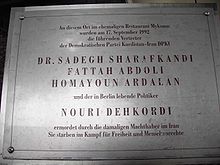- Mykonos restaurant assassinations
-
In the Mykonos restaurant assassinations (Persian: ترور رستوران میکونوس, also the "Mykonos Incident"), Iranian-Kurdish opposition leaders Sadegh Sharafkandi, Fattah Abdoli, Homayoun Ardalan and their translator Nouri Dehkordi were assassinated at the Mykonos Greek restaurant in Berlin, Germany on 17 September 1992.
In the Mykonos trial, the German court found Kazem Darabi, an Iranian who worked as a grocer in Berlin, and Lebanese Abbas Rhayel, guilty of murder and sentenced them to life in prison. Two other Lebanese, Youssef Amin and Mohamed Atris, were convicted of being accessories to murder. In its 10 April 1997 ruling, the court issued an international arrest warrant for Iranian intelligence minister Hojjat al-Islam Ali Fallahian[1] after declaring that the assassination had been ordered by him with knowledge of supreme leader Grand Ayatollah Ali Khamenei and president Ayatollah Rafsanjani [2] . This led to a diplomatic crisis between the governments of Iran and several European countries, which lasted until November 1997.[citation needed]
In a 2004 letter to Berlin mayor Klaus Wowereit, Mahmoud Ahmadinejad (then mayor of Tehran) objected to the commemorative plaque in front of the restaurant, calling it an insult to Iran.[3]
Despite international and domestic protests, Darabi and Rhayel were released from prison on 10 December 2007 and deported back to their home countries.[4]
At the same dinner where the four were executed also two-term Prime Minister of Sweden and then leader of the Swedish Social Democratic Party Ingvar Carlsson, then party secretary of the Swedish Social Democratic Party Mona Sahlin and former Swedish State Secretary for Foreign Affairs Pierre Schori were originally intended to participate.[5] However, due to a telephone call to Ingvar Carlsson from then Prime Minister of Sweden Carl Bildt, who urged Carlsson to immediately return to Sweden due to the urgent state of the Swedish economy, all three flew back to Sweden the same day and thus probably escaped being assassinated as well.[5]
Contents
Adaptations in Media
The events surrounding the Mykonos restaurant assassinations and subsequent trial were adapted into a non-fiction story by Roya Hakakian in her book Assassins of the Turquoise Palace.
See also
- Iran-Germany relations
- 1986 Berlin discotheque bombing
- Chain Murders of Iran
- Kurdistan Democratic Party of Iran
References
- ^ Israel fails to prevent Germany freeing Iranian
- ^ Roya Hakakian (2007-10-04). "The End of the Dispensable Iranian". Der Spiegel. http://www.spiegel.de/international/0,1518,476369,00.html. Retrieved 2009-01-31.
- ^ Germany and Iran Embroiled in Diplomatic Spat | Germany | Deutsche Welle | 28.04.2004
- ^ Germany Deports Iranian jailed for 1992 murders
- ^ a b Svensson, Niklas (26 maj 2010). "Här kunde Sahlin och Carlsson ha mördats" (in Swedish). Expressen. http://www.expressen.se/Nyheter/1.2001473/har-kunde-sahlin-och-carlsson-ha-mordats. Retrieved 26 maj 2010.
External links
- CNN: German court implicates Iran leaders in '92 killings
- Official court ruling, pdf, German
- Iran Human Rights Documentation Center: Murder at Mykonos: Anatomy of a Political Assassination
- "Holy Crime" A Documentary by Reza Allamehzadeh about the assassinations (English version on YouTube)
- Assassinations of Those Who are against Iran's Government; An Interview with Reza Allamehzadeh (Radio Zamaneh, in Persian)
Coordinates: 52°29′41″N 13°20′03″E / 52.49472°N 13.33417°E
Categories:- Terrorist incidents in 1992
- History of Berlin
- History of the Islamic Republic of Iran
- History of the Kurdish people
- Terrorism in Germany
Wikimedia Foundation. 2010.

